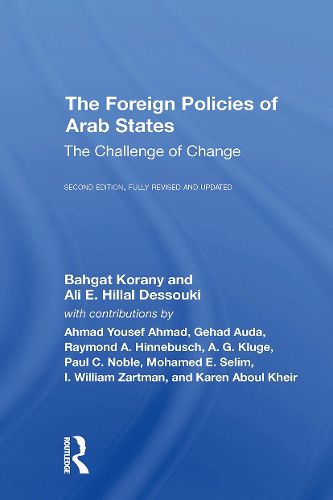Readings Newsletter
Become a Readings Member to make your shopping experience even easier.
Sign in or sign up for free!
You’re not far away from qualifying for FREE standard shipping within Australia
You’ve qualified for FREE standard shipping within Australia
The cart is loading…






Middle East politics have been proverbial for their changeability. The 1970s ushered in petro-politics, for instance, but OPEC's international status declined markedly in the following decade. Similarly, the Arab world's ostracism of Egypt in the 1970s following its separate peace with Israel was turned around in the 1980s; the late 1980s also brought PLO acceptance of the State of Israel. Interstate relations were not the only arena to experience significant alterations; state-society relations also underwent dramatic changes, such as the acceleration of privatization in erstwhile socialist regimes. Then the 1990s opened with a political earthquake: the Gulf Crisis. The second edition of this highly acclaimed text offers a penetrating analysis of trends in Arab foreign policies since the book was originally published in 1984, including an early analysis of the effects of Iraq's invasion of Kuwait and the subsequent coalition victory over Iraq. In addition, the authors have included new chapters on Jordan-at the heart of the Arab world-and on the Sudan-the region's link to sub-Saharan Africa. Their inclusion allows a fuller understanding of the foreign policies of states that occupy crucial geopolitical positions but wield little tangible power. Moreover, in many of its chapters the book raises the crucial question of how the foreign policies of these countries can cope with the prevalence of political change.
$9.00 standard shipping within Australia
FREE standard shipping within Australia for orders over $100.00
Express & International shipping calculated at checkout
Middle East politics have been proverbial for their changeability. The 1970s ushered in petro-politics, for instance, but OPEC's international status declined markedly in the following decade. Similarly, the Arab world's ostracism of Egypt in the 1970s following its separate peace with Israel was turned around in the 1980s; the late 1980s also brought PLO acceptance of the State of Israel. Interstate relations were not the only arena to experience significant alterations; state-society relations also underwent dramatic changes, such as the acceleration of privatization in erstwhile socialist regimes. Then the 1990s opened with a political earthquake: the Gulf Crisis. The second edition of this highly acclaimed text offers a penetrating analysis of trends in Arab foreign policies since the book was originally published in 1984, including an early analysis of the effects of Iraq's invasion of Kuwait and the subsequent coalition victory over Iraq. In addition, the authors have included new chapters on Jordan-at the heart of the Arab world-and on the Sudan-the region's link to sub-Saharan Africa. Their inclusion allows a fuller understanding of the foreign policies of states that occupy crucial geopolitical positions but wield little tangible power. Moreover, in many of its chapters the book raises the crucial question of how the foreign policies of these countries can cope with the prevalence of political change.